- Home
- Gregory Maguire
A Lion Among Men Page 2
A Lion Among Men Read online
Page 2
In the herb garden, a spiderweb grew on the sundial. No one swept it away. On bright days, laddered shadows crept across the oxidizing numerals, giving the numbered hours new accents, one by one, until the sun went down or the clouds came in. Any variety of darkness can silence a sundial.
Maybe there would be no armed conflict, the maunts commented encouragingly. But each maunt in her own way felt the curse of war’s inevitability.
Sister Laundry would no longer dry the sheets in the sun, for they looked like white flags of surrender and no one wanted soldiers garrisoned in the mauntery. Sister Hospitality began refusing shelter to wanderers through these isolated reaches, lest they turn out to be secret agents. Behind closed doors, Sister Apothecaire availed herself of a calming beverage usually reserved for those in medical distress. Sister Petty Cash had bad dreams. “The cost of war,” she murmured, her voice trailing off.
“We’ve no reason to fear either army,” insisted Sister Doctor, when the subject came due for an update at Council. “Three weeks ago, when the Munchkinland marauders swept by, making their inept preemptive strike into Loyal Oz, they didn’t stop to rape and plunder us as they passed. They hoped to wreak havoc on the Emperor’s forces massing to the west, but it appears the upstarts have managed only to wreak a spot of bother. Sisters, be sensible. Now the Munchkinlanders are in—what’s it called?—hot retreat. Fleeing for their lives. They’ll be too distracted to drop in for a refreshment while they’re being pushed back to their own borders. Lighten up.”
The maunts, pledged to obedience, tried to lighten up, though Sister Doctor’s customary brusqueness of diagnosis seemed, perhaps, inadequate to riddles of military strategy.
Still, the House of Saint Glinda in the Shale Shallows, meant to be remote from worldly concerns, stood this month like a Gillikinese sycamore trying to camouflage itself in a Quadling rice paddy. An exceedingly prominent target. There was no other establishment in the district so capacious, so securable, so fitted with supplies. Most of the maunts felt it was only a matter of time. And when the time came, which army would knock at the doors? The home team or the rebel rabble? The well-trained Emerald City army forces or the Munchkinlander militia, that ad hoc volunteer swarm? Though the mauntery stood in Loyal Oz, the maunts, by dint of their spiritual allegiances, considered displays of patriotism inappropriate, if not gauche. Though they did wonder: Would either adversary show mercy to the self-quarantined isolates of a religious order?
“Of course they will,” argued Sister Doctor from the lectern. “We are the exemplars of mercy. We set the standard, and an army has no choice but to respect our standards.”
The maunts nodded, respectful but unconvinced. Men were beasts. Everyone knew that. It’s why most of the women had entered the mauntery in the first place.
Dinner conversation revolved around nothing but military operations. These days the women had to raise their voices to be heard above the sound of military skirmishes. Practice charges, they hoped. Trees were being felled for the construction of catapults: Who could think properly with all that racket? Who could pray—or, put another way, who could stop praying?
To add injury to insult, a projectile of flaming pitch and straw went astray and landed on the leads of the chapel, so the Council was burdened with the added annoyance of home repair. It was impossible to persuade skilled trade to venture behind the battle lines. Sister Hammer did what she could, but even so.
Nightly, from the bluestone bartizans, Sister Doctor reviewed the campfires of opposing forces as they shifted back and forth, west and east. A sally, a retreat: one could read the campaign from this height. Mutton for supper; one could smell the menu.
Blinking with encouragement, she reported that the Emerald City brigades looked set to push the Munchkinlander upstarts back to their borders and perhaps beyond, farther east, right into Munchkinland proper. Sister Apothecaire, a displaced Munchkin of the shorter sort, wasn’t able to suppress a bark of affront at this naked sympathy for the Throne. So Sister Doctor shut up about the rumor that the Emperor was going to use the Munchkinlanders’ misadventure as an excuse to invade and to capture the lake of Restwater, finally to sever dissident Munchkinland, the breadbasket of Oz, from its own water supply. Political pundits had long predicted this action: The Munchkinlander militias had cooked their own goose, but good. Done Loyal Oz a great service, they had, by ceding the moral high ground, handing their enemy a legitimate reason to retaliate. Very smart of them. The little morons.
“Remember to breathe,” advised Sister Doctor to her companions. “It is, after all, the secret of life.”
Obediently, the maunts breathed, if not much easier, and they sang songs of gratitude for having been spared—for those who had been spared, they took pains to remember.
They paid for their neutrality in baskets of apples, in buckets of water pulled from their well. They fed the professional Emerald City Messiars as fully as, three weeks earlier, they had fed the stumpy little Munchkinlander farmer-soldiers. They never stinted at feeding the hungry, as long as the portions could be lowered over the wall in a basket, as long as the hungry didn’t need spoon-feeding. There was a limit to everything: eggs, bandages, breath, even mercy. If the maunts beggared themselves, who would be left to offer even half a mercy?
When Sister Doctor and her lowly and disgruntled colleague, Sister Apothecaire, went forth to tend to the wounded, they left by a back door, and under cover of darkness.
• 3 •
S OME MILES south—away from the nickering of cavalry horses, the cloudy antiphons of the maunts—the nighttime sounds of Oz took on a more arbitrary rhythm. A breeze in the higher branches of trees. The percussive thunk of a frog objecting to his neighbors. Silky passage of water snake, chirr of midnight mosquito. Woodland Oz going about its nocturnal business. Adequate peace.
Safely buried in deep forest, the infallible Clock counted out the seconds of its life in waltzing ticks like hazelnuts dropping into a wooden bucket. Tik tik tok, tik tik tok.
The dwarf and his company of superstitious boys snored on. The Clock’s only female attendant, a woman of uncertain age, kept the night watch against reconnaissance scouts or beasts or light-fingered mendicants. She was still new to this troupe—and she owed them her life—so she did what she was told, picking up what information she could as it fell her way.
She’d learned that now and then, sometimes for years at a stretch, the Clock of the Time Dragon dropped out of sight. The acolytes of the Clock would shutter up the preposterous thing. They trusted in its own infernal charms to protect it. And maybe the boys were sensible enough to do so. Whenever the sergeant-at-hand called back the company—a few starry-eyed converts compensating for any no-shows—they apparently always found their treasure in working trim. Sometimes it would be overgrown with forest ivy or moss. Dead leaves, tendrils of cobweb. Perhaps a kind of natural camouflage the Clock called to itself. It didn’t matter. The handmade masterpiece snapped right back to business. The play of its gears remained deft, the tension in its belts and chains keen. Its mechanical advantage was said to have been augmented by a stubbornly adhesive magic.
The night watchwoman, a novice in service of the Clock, had asked the sergeant-at-hand their destination.
“We meander as whimsy dictates unless the Clock gives explicit advice,” he’d answered. “Whimsy is fate, too: just less knowable.”
“Did whimsy bring you to rescue me, Mr. Boss,” she asked, “or were you bound by advice?”
“That’s what they all want to know.” The sergeant-at-hand, a dwarf with regrettably sloppy habits of dental hygiene, leered his mustardy smile. “But it’s confidential, my darling, my dimple. Trade secrets indeedy.”
For five weeks the self-appointed acolytes had been pushing and dragging the towering Clock, which was mounted on a wheeled flatbed. They kept away from farmhouses, going overland through pastures and paddocks. If they had to pass through a small village, they waited till midnight.
Th
e equipage rocked and lurched like a small ornate ship on stony seas. Above, the clockwork dragon supervised. How much of Oz those dull eyes had taken in. Oz rehearsing itself, rearranging itself decade after decade. Whimsy and fate, destiny and accident. The fall of the house of Ozma, the dirty years of the Wizard, the rise of impeccable Shell, holy Emperor of Oz. Fortunes, in any case: changeable fortunes converted into the changeless facts of biography by every passing tick of its mechanisms.
After the Clock had rescued her, its sergeant-at-hand had briefed the newest convert. “We pick our way with superior caution,” the dwarf told her. “Everything’s tinder-hot now and ready to conflagrate. We have our task. The Clock tells us so. Quietly, quickly, like mice stealing between the toes of battling manticores and basilisks, we inch forward as we’re told.”
“Imagine what it’s seen since we last brung it along to an audience,” one beardless boy said. “Imagine the stupefied Squirrel or idiot Monkey coming across this in the greenwood! Sitting all ’lone and full of itself, like a pagan temple! Without us to service it, you think our smoky friend here would rouse itself and deliver a pronouncement?”
“For a chattering Monkey? Get real. That ever happen, I’d like to see so! Fun for the Monkey who goes shrieking mad and he drop right out of his tree!”
The dwarf knew, but did not say, that in those quiescent periods in the forsaken outlands, creatures did creep up to sniff, to examine, even to climb over the peculiar heap of marvels. A dense woods is not off-limits to its own residents. And woodland creatures take notice of everything invading their territory, including fate.
Monkeys, venerable and caustic, lost no opportunity to chitter. Parrots, much given to expressing their opinions, gossiped in serrated squawks. Younger, more timid habitants approached in their own time. A garter snake and his sister. A raccoon with a tendency to morbid depression. The odd lion cub among them.
The newest vigil keeper didn’t worry so much about animals. Let them come up and sniff. It was men she avoided as best she could. So she liked this task of midnight watch. In company but still alone. The lads in a loose jumble of limbs, their wizened old sergeant-at-hand shifting in his creaking hammock. She could move around as she liked. It wasn’t that, if awake, this lot would plague her much. They knew better. But she enjoyed the privacy. To the veteran of prison, solitude can offer few unsavory surprises.
She removed her shawl and hung it on a branch, and with steps that whispered in the pine needles, she approached the water. A small cove of Restwater, Oz’s inland sea, made an intimate bathing chamber. Once out of sight of her sleeping companions—out of sight should they awaken, that is—she unfastened the clasps of her tunic and lifted it over her shoulders. Beneath, she wore a binding sheath, which she loosened and began to remove, folding it back upon itself as she exposed her stomach and then her breasts.
She wasn’t thinking of her breasts, still full and high, though the hormone-whipped lads often did. She was thinking of white paper and dark ink, and the difficulty and danger of scoring a page with lines of ink, to make it sing, if it could. If she could make it.
But if it sang, perhaps it would say something other than she intended. Perhaps it couldn’t help but say who she was, where she was, though she kept all things hidden that she could manage.
Books could seem to unleash all the hallelujahs of hell—she had known one that could, in her past; it was a volume of enchantments known as the Grimmerie—but even books that did not detonate into history, as the Grimmerie had, could still whisper their private secrets. And her appetite to write was countermanded by a dread of being read and recognized.
Her breasts, loosened from their cotton corset, itched; they rolled outward, toward her biceps. Absentmindedly she caressed first one and then the other with the back of her hand. Then she untucked the sash that secured her skirts. She hung the skirts on nearby branches, further curtaining herself from mortal eyes, should any be open.
Before she stepped into the still water, she ran the fingers of her right hand along the scar between her legs. This was not for pleasure—there was no pleasure left—but as a test of assurance that the seal had not been broken.
Solitude, continence, silence: custody of her own history; custody of any future that might have descended from her, squawking and looking to suck.
Satisfied. More than satisfied, relieved, she arched a foot to enter the water. But before she did, she saw in the flat green of the pond’s surface a reflection of a moon. At first she thought: Now there’s a surface safer to write upon than paper. The circular page of the moon in the water—words written in water are sure to wash away, and the moon itself no wiser.
Lowering herself to her haunches, preparing to bathe, she realized she was not entirely unobserved. She could see upon the water a curlicued sort of growth like a backward question mark. She knew it for the reflection of the head of the dragon to whose service she and the others were committed.
The dragon’s eye was red, red in the green water. Red, unblinking, unblinkered.
You, you can look all you want, she thought, but even so she slipped into the water hastily.
What words she had thought to write on the face of the moon were washed away from her as she submerged, trying to disturb no one, nothing. Trying not so much as to interrupt a current, even trying not to shatter into soft-edged platelets the green moon in the reflection. Trying to sidestep having any influence at all, now and till the end of her life.
• 4 •
A T DAWN Sister Hospitality was summoned to the back door of the mauntery when the medical team returned, accompanied by a tall, stooped figure.
“We are not housing soldiers,” hissed Sister Hospitality. “You know I made that perfectly clear at Council, Sister Doctor.”
“Whatever this fellow is,” said Sister Doctor, “he is not a soldier.”
The chap was wearing a traveling cloak with a hood finished with bristles of greasy fur—or that is how Sister Hospitality saw it at first. When the visitor dropped the hood, she realized the fringe of fur was an unkempt mane, and the man in need of sanctuary was in fact a Lion.
Sister Hospitality snapped, “Who is this, then? What class and category of aberration? A deserter? A conscientious objector? A visitor from the press?”
“An emissary on a neutral mission,” replied Sister Doctor, removing galoshes caked with gore better left unidentified. “He is taking advantage of the safe passage here allowed by the forward front of the EC Messiars. And we welcome him, Sister Hospitality.” She spat out the name.
The Lion studied the floor as if expecting to be turfed out. An unlit cigar dangled in his mouth, a pad of paper projected from his vest pocket, and a pair of spectacles fitted with green-glass bifocal lenses hung on a chain from his velvet lapel. Sister Hospitality noticed some greying mane hairs stuck to the front of his cloak. His posture…well, it made Sister Hospitality square her own shoulders in a superior way.
“Brrr,” said the visitor.
“Let me fetch you a warming cocoa,” said Sister Hospitality, without much enthusiasm.
“No,” he replied, “cocoa disagrees with me. Brrr, I was introducing myself. Brrr, the name.” He handed over a card on which was scribbled an illegible note to himself. “Sorry, other side.” There it was: BRRR, three rs. COURT REPORTER TO THE EMERALD CITY MAGISTRATES.
Sister Doctor and Sister Apothecaire hung up their own robes—Sister Apothecaire using a lower hook. Sister Doctor stumped off in her stocking feet without further comment. Her diminutive associate blushed by way of apology. “Sister Doctor and I must enter our activities in the Log of the House,” said Sister Apothecaire to their guest. “Please excuse me, too. Sister Hospitality will see to your needs.” She left the Lion standing among the cleaning buckets, the barrels of cornmeal, the bins of dried beans.
Sister Hospitality went to hang the Lion’s traveling cloak in a clothes press. When a pocket twitched, Sister Hospitality recoiled with a shudder and she tried unsucce
ssfully to disguise her curse as a cough.
“Oh, my guard cat has scared you good,” said the Lion—almost approvingly, thought Sister Hospitality. “Nearly forgot about my little kitty-thingy. It’s been following me since Shiz. I must be the first Lion it ever saw, and it’s become smitten. Look at it, the little dollop.”
The cat may have been white once, but it was old enough for its fur to have thinned. “I never saw such a thing,” said Sister Hospitality. “It’s distinctly offensive. Creepy. Almost transparent. Male or female?”
“That much isn’t transparent, I’m afraid. Everything else is.”
“What ailment does it suffer from?”
“Cats don’t usually last as long as this one clearly has,” said Brrr. “That’s my guess. A cat gets old, its fur goes white, it dies. This one’s got some years on it, looks like, and if cat fur is white to start out with, how much paler can it go? Look.” He rubbed the cat’s arthritic spine, and a net of hairs came off on the pad of his paw. He held them out. Each hair looked like nothing so much as a thread of glass.
“Revolting,” said Sister Hospitality, charitably enough.
“Look, it hardly has a shadow,” said Brrr, and this was almost true; the morning light of the vestibule slanted through where the cat stood, stretching arthritically on the flagstones.
“What name does it answer to?”
“Have you ever known a cat to answer to anything?” said the Lion. “But I call it Shadowpuppet, for old as it is, it still enjoys the game of stalking prey.”
“If it’s as fragile as glass, it will be pleased to learn that our own mousers have recently fled,” said Sister Hospitality. “Cats can be so territorial. Present company excepted,” she continued, leading him up the stairs toward a receiving parlor.
“Oh, I’m territorial enough,” said the Lion. “Still, Shadowpuppet never leaves me, and I think I can scare off your convent cats if they come back.” He lifted Shadowpuppet, because the stairs were too steep, and Sister Hospitality would not pause even for a cat of advancing years.

 Missing Sisters
Missing Sisters Wicked: The Life and Times of the Wicked Witch of the West
Wicked: The Life and Times of the Wicked Witch of the West After Alice
After Alice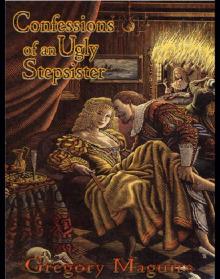 Confessions of an Ugly Stepsister
Confessions of an Ugly Stepsister Son of a Witch
Son of a Witch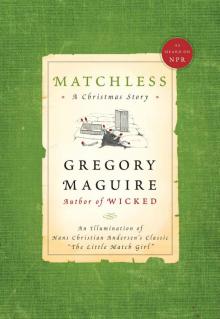 Matchless
Matchless The Next Queen of Heaven
The Next Queen of Heaven Leaping Beauty: And Other Animal Fairy Tales
Leaping Beauty: And Other Animal Fairy Tales Hiddensee: A Tale of the Once and Future Nutcracker
Hiddensee: A Tale of the Once and Future Nutcracker A Wild Winter Swan
A Wild Winter Swan Egg & Spoon
Egg & Spoon Out of Oz
Out of Oz Leaping Beauty
Leaping Beauty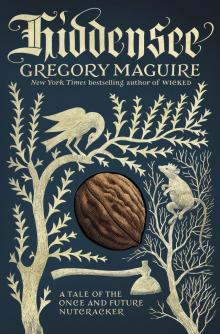 Hiddensee
Hiddensee The Wicked Years Complete Collection
The Wicked Years Complete Collection The Next Queen of Heaven: A Novel
The Next Queen of Heaven: A Novel